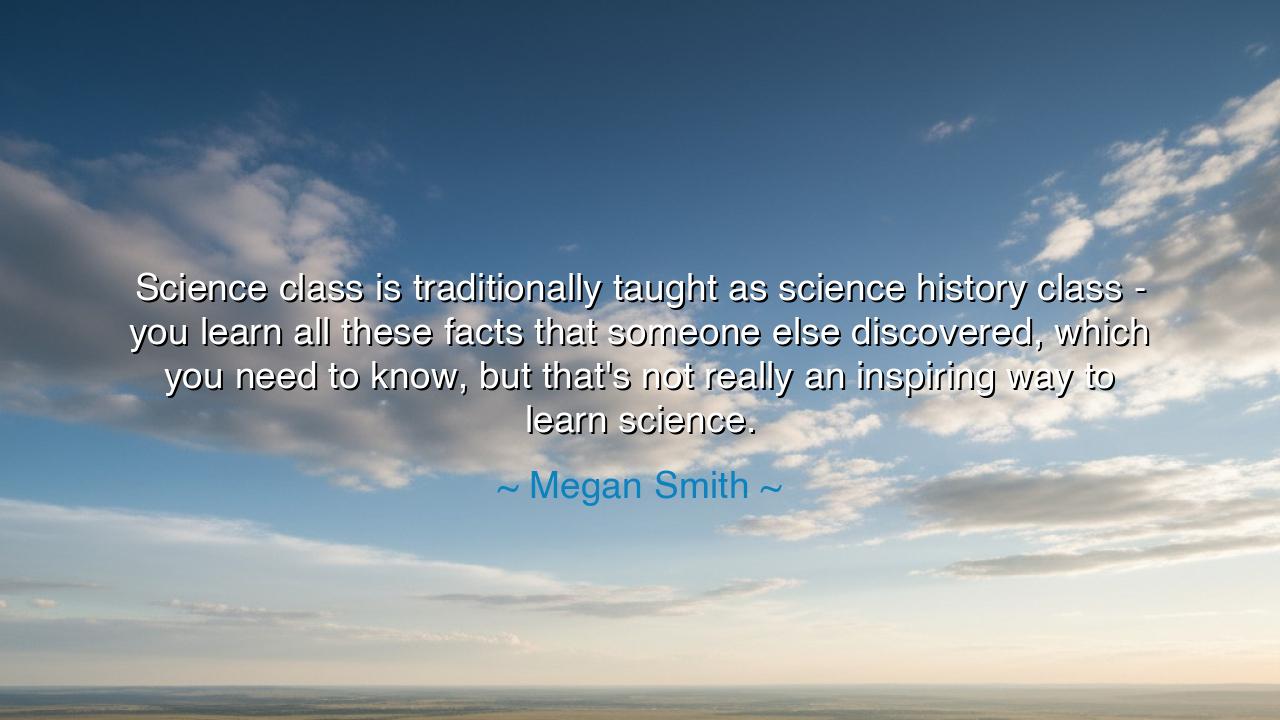
Science class is traditionally taught as science history class -
Science class is traditionally taught as science history class - you learn all these facts that someone else discovered, which you need to know, but that's not really an inspiring way to learn science.






"Science class is traditionally taught as science history class - you learn all these facts that someone else discovered, which you need to know, but that's not really an inspiring way to learn science." These words from Megan Smith resonate deeply with the essence of true learning. To learn science in the way Smith describes, as merely a list of facts and historical discoveries, is to miss the very heart of what science is about. Science is not just the accumulation of knowledge from the past, but a living, breathing force that calls us to inquire, to experiment, and to discover for ourselves. It is an exploration, an ongoing journey of wonder and curiosity—not merely a record of what others have already uncovered.
In the ancient world, learning was not confined to memorizing facts or repeating the words of those who came before. The philosophers of Greece, such as Socrates, Plato, and Aristotle, approached knowledge as a dynamic process of discovery. Socrates famously said, "I know that I am intelligent because I know that I know nothing." For Socrates, true learning was not about simply absorbing established facts but about questioning, challenging, and exploring the world. Science, to the ancient thinkers, was an active pursuit—a dialogue with the universe, not a passive inheritance of knowledge.
Consider Aristotle, who not only accumulated knowledge but used it as a tool for discovery. He didn’t merely pass on facts; he encouraged his students to look at the world around them, to observe, to reason, and to experiment. His approach was not about memorization, but about engaging with the world as an active participant in the process of understanding. Socrates and Plato did the same—guiding their students not to accept knowledge passively, but to question and seek their own answers. In this sense, science, even in ancient times, was not a history class, but an ongoing exploration.
In our own time, Megan Smith calls attention to the fact that modern science education has, in many cases, become too focused on the past, on the accomplishments of those who have come before us. While it is essential to know the discoveries of Newton, Einstein, and countless others, Smith suggests that we must also inspire students to create, to discover, and to see themselves as active participants in the scientific journey. When science is taught merely as a history of past discoveries, it risks becoming something that students view as distant and irrelevant, rather than as a tool to shape their own futures. Smith urges that we shift from simply teaching science as facts to fostering an environment where curiosity is cultivated, where students are encouraged to ask questions and find answers.
Consider the story of Marie Curie, whose pioneering work in radioactivity changed the course of science. Curie did not begin her journey by simply reading the facts handed down by others. She did not accept the scientific world of her time as unchangeable. Instead, she sought to answer the questions that others had left unexplored. Her discoveries in physics and chemistry were not based on rote memorization, but on a relentless desire to explore the unknown. She exemplified the true spirit of science—it is a quest, a search for truth, and a journey of discovery. Curie’s work was not about repeating history; it was about creating the future of science. This is the spirit that Smith advocates—teaching students to be innovators, not merely receivers of knowledge.
The lesson here is clear: science is not a static body of facts, but a dynamic process of discovery and exploration. It should inspire, not stifle, the imagination. Science is meant to be a tool with which we shape the world, not just a collection of old truths. We must embrace the tradition of active inquiry practiced by the ancients, and foster in students the belief that science is something they can create, not just something they learn. It is a call to engagement, a call to wonder, and a call to participate in the ongoing quest for understanding.
In your own life, whether you are a teacher, a student, or simply a curious soul, remember that learning is not about memorizing the past; it is about engaging with the world and seeking the answers that lie ahead. Science is alive—it is in the questions you ask, the experiments you conduct, and the new truths you uncover. So do not just memorize the facts; embrace the spirit of discovery. Challenge what you know, question what you are told, and seek your own answers. In doing so, you will contribute not only to the body of knowledge, but to the ongoing story of human curiosity and progress.






AAdministratorAdministrator
Welcome, honored guests. Please leave a comment, we will respond soon